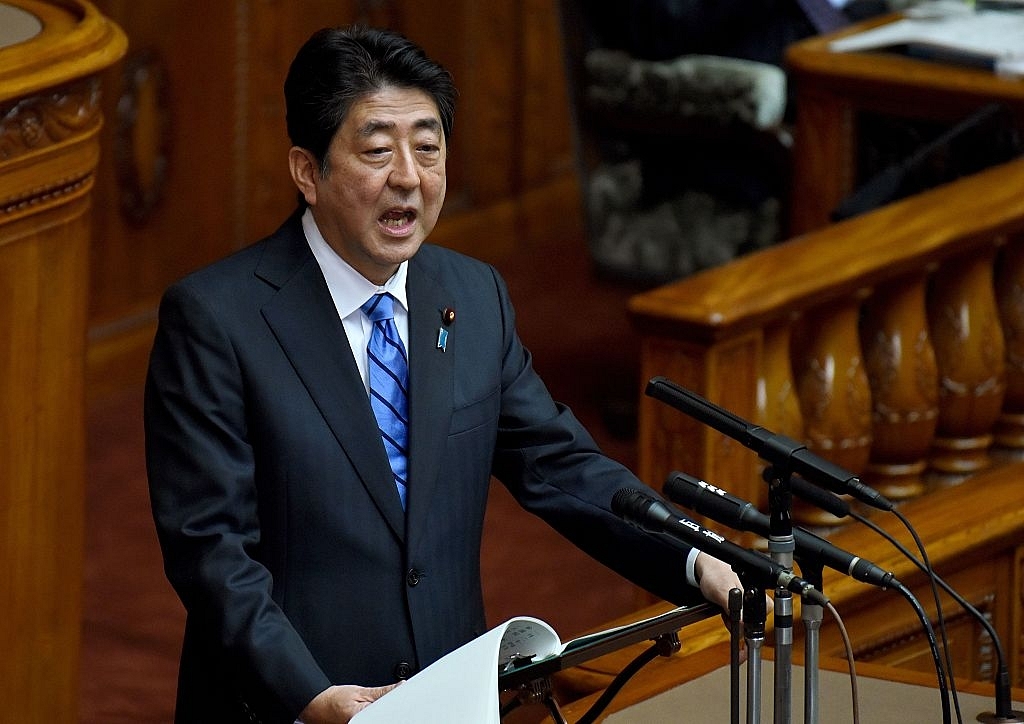Context
Shinzo Abe: Former Prime Minister Of Japan No More After Being Shot

Japan’s Prime Minister Shinzo Abe (TORU YAMANAKA/AFP/Getty Images)
Shinzo Abe, Japan's longest-serving prime minister since the Second World War, was shot dead today (8 July).
Who did it? Abe was allegedly shot by Tetsuya Yamagami, a man in his 40s who is believed to have served in Japan's Maritime Self-Defence Force.
The Maritime Self-Defence Force is Japan's equivalent of a navy.
The suspect, a Nara local, is in police custody.
Abe was speaking at a campaign event when he was shot. He later passed away in a hospital.
He was 67 years old.
Where was this? Abe was shot when he was delivering a stump speech on behalf of Kei Sato, a member of Japan's Upper House running for re-election, at a road junction in Nara.
The Prime Minister of Japan, Fumio Kishida, said, "This is a heinous act of brutality that is utterly unforgivable."
What's known: Abe was shot at around 11.30 am Japanese time.
The motive for the attack is yet to be ascertained.
Abe was rushed to a hospital following the attack. According to the fire department, he was showing no vital signs.
Yoshio Ogita, 74, secretary-general of Nara Prefecture's Liberal Democratic chapter, was standing next to Abe. He said he heard two loud sounds and saw a plume of white smoke rising into the sky. "I didn't know what had happened. I saw him collapse," Ogita said.
Gun shootings in Japan are extremely rare.
Japan enforces strict laws on gun ownership, and shootings are rare.
According to police records, there were merely 21 arrests for the use of firearms in 2020, 12 of which were gang-related. This is in a country of 125 million people.
Abe at the helm: He took charge of the prime minister's office for the first time in 2006.
In his first stint, he served as prime minister between 2006 and 2007.
He returned as prime minister in 2012 and served till 2020.
In late 2020, Abe resigned as prime minister, citing poor health. He was being treated for ulcerative colitis, a chronic intestinal disease.
Family of political leaders: Abe is the grandson of Nobusuke Kishi.
Kishi had served as the prime minister of Japan from 1957 to 1960.
He had survived an assassination attempt in the final days of his tenure.
Abe's father served as a foreign minister. Abe was initially elected to Parliament in 1993 after his father's death.
Unfinished agenda: Abe had promised to fix Japan's beleaguered economy with his 'Abenomics' policies.
Abe had hoped that an overwhelming victory by the Liberal Democratic Party in the Upper House elections would enable him to make progress on one of his most dearly held political aspirations — revising Japan's pacifist Constitution to allow the country to have a standing military.
PM Narendra Modi expressed his shock and grief over the death of Abe.
Modi and Abe were known to have a close personal relationship from before Modi became India's PM and it continued after Abe resigned from his position.
Abe was awarded India's second-highest civilian honour, the Padma Vibhushan, in 2021 for his contribution to furthering the India-Japan relationship.
A full day of national mourning was announced by PM Modi on 9 July as a mark of respect for the late Shinzo Abe.
Support Swarajya's 50 Ground Reports Project & Sponsor A Story
Every general election Swarajya does a 50 ground reports project.
Aimed only at serious readers and those who appreciate the nuances of political undercurrents, the project provides a sense of India's electoral landscape. As you know, these reports are produced after considerable investment of travel, time and effort on the ground.
This time too we've kicked off the project in style and have covered over 30 constituencies already. If you're someone who appreciates such work and have enjoyed our coverage please consider sponsoring a ground report for just Rs 2999 to Rs 19,999 - it goes a long way in helping us produce more quality reportage.
You can also back this project by becoming a subscriber for as little as Rs 999 - so do click on this links and choose a plan that suits you and back us.
Click below to contribute.
Latest